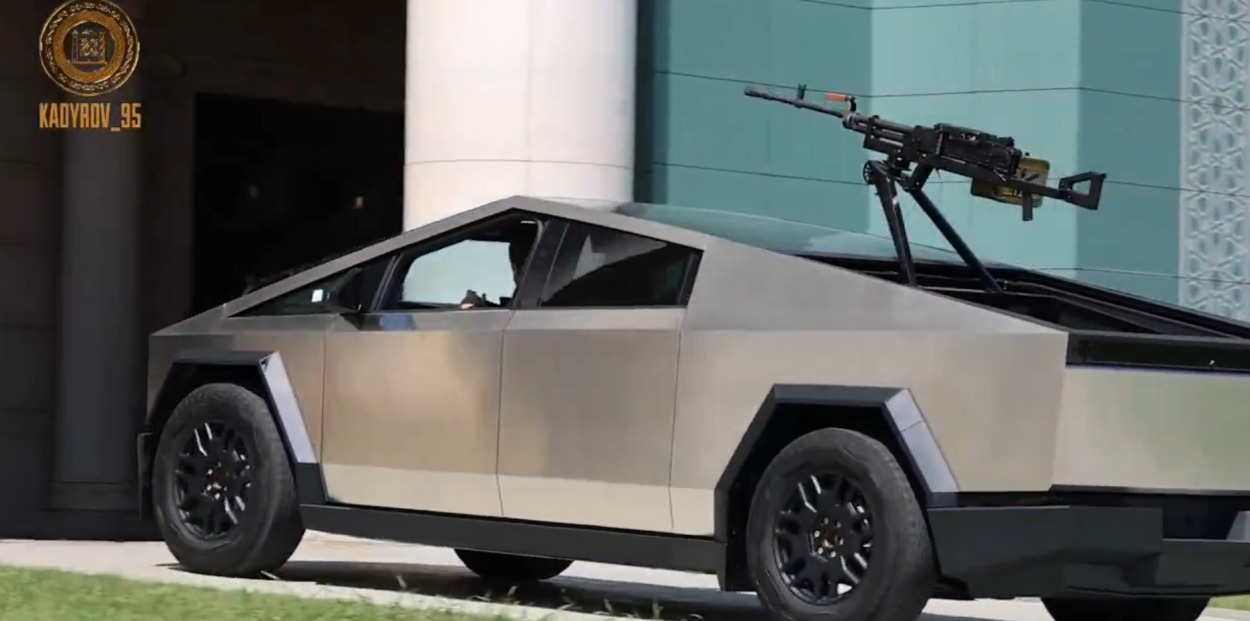With the world still grappling with the remotely caused pager explosions that rocked Hezbollah ranks and civilians across Lebanon and Syria, Chechen warlord Ramzan Kadyrov has claimed that U.S. billionaire Elon Musk “remotely” disabled his Tesla Cybertruck.
Last month, Chechen warlord and Russian loyalist Ramzan Kadyrov released a video of him operating a Tesla Cybertruck equipped with a machine gun on its roof. The Chechen strongman claimed that the Tesla Cybertruck had been gifted to him by US billionaire and Tesla CEO Elon Musk, who he described as “the strongest genius of our time.”
The Cybertruck is an electric pick-up truck that was first unveiled by US carmaker Tesla in 2019 and entered production in 2023.
The skillfully edited footage showed Kadyrov driving the Cybertruck around an empty square in Grozny, the capital of Chechnya. As the video continues, Kadyrov exits the vehicle wearing an ammunition belt around his neck and positions himself behind the machine gun.
‘Raptor Salad’ For Lunch! US F-22 Raptor Outgunned, Outmaneuvered By German Eurofighter Typhoon?
“We received a Tesla Cybertruck from the respected Elon Musk. I was happy to test the new equipment and personally saw that there’s a reason that it is called the ‘Cyberbeast,” Kadyrov wrote on Telegram.
In his post, he emphasized that he “literally fell in love” with the vehicle, which he said was “invulnerable,” “fast,” “comfortable,” and “maneuverable.”
https://twitter.com/Gerashchenko_en/status/1824818908500816224
Soon after the video was published, Elon Musk, who also owns social media site X (previously Twitter), wrote on his account: “Are you seriously so retarded that you think I donated a Cybertruck to a Russian general?”
In a serious turn of events, the Chenchen warlord has now claimed that Elon Musk remotely disabled the Cybertruck that he had generously gifted to him.
Moscow Slams Portugal’s Transfer of Russian Aircraft To Ukraine; Terms It A ‘Hostile Step’
“Now, recently, Musk remotely disabled the Cybertruck,” Kadyrov wrote in a post on his Telegram account. “That’s not a nice thing for Elon Musk to do. He gives expensive gifts from the bottom of his heart and then remotely switches them off,” he added.
https://twitter.com/elonmusk/status/1825307592404398131
He also published another video of at least two Cybertrucks operating at an undisclosed location just a day after accusing Musk of disabling them. Pro-Ukrainian military watchers have since dismissed it as a propaganda video aimed at flattering Elon Musk.
Further, the warlord stated that the Cybertruck had been deployed in the Ukraine war where it “performed admirably”. While these claims could not be verified independently, they are consistent with previous assertions made by Kadyrov.
He claimed last month: “Based on such excellent characteristics, the Cybertruck will soon be sent to the special military operation zone. I am sure that this ‘beast’ will bring a lot of benefit to our fighters.”
https://twitter.com/clashreport/status/1837045901749101042
Kadyrov has been in power in Chechnya for more than 17 years and is widely regarded as the country’s “Iron Man.” Born into a family of rebel warlords, he has long been Putin’s staunchest supporter and refers to himself as the president’s “foot soldier.” The 47-year-old leader claims to have sent thousands of soldiers to support the Kremlin’s offensive in Ukraine.
Elon Musk has yet to respond to Kadyrov’s claims.
Musk has a love-hate relationship with Ukrainian authorities despite helping Ukraine with the Starlink satellite network. Some time ago, Musk reportedly refused to allow Ukrainian troops to use Starlink internet devices to help launch attacks on Crimea last year, a move that was lamented by Ukraine.
There have been several instances where Ukrainian officials have openly criticized Musk’s position in the ongoing war, including when he put up an Internet poll inviting respondents to think of solutions that could end the war.

As bizarre as Kadyrov’s claims are, it cannot be established how Musk may have deactivated the Cybertruck remotely. Interestingly, these claims have come just a day after Israel was accused of remotely exploding thousands of communication devices across Lebanon and Syria in a bid to decimate the Iran-backed Hezbollah militant group based in Lebanon.
The Pager Explosion In Lebanon
On September 17, scores of explosions were reported across Lebanon and Syria, with thousands of pagers exploding within the ranks of Hezbollah, Iranian diplomats, and civilians. As the world was still processing the bizarre news, another spate of fresh explosions was reported in hand-held walkie-talkie VHF sets used by Hezbollah on September 18.
Although it was first thought that Israel had pulled off a massive cyberattack straight out of a Hollywood film, it has since been believed that supply chains were likely breached and explosives had been planted in the Taiwan-exported pagers.
‘Raptor Salad’ For Lunch! US F-22 Raptor Outgunned, Outmaneuvered By German Eurofighter Typhoon?
Analysts believe that the Israeli intelligence agency Mossad would have found it easier to sabotage the pagers, inserting explosives (allegedly three grams of explosives per pager) and a detonator in them before they landed in Lebanon.
The attack has been described as Hezbollah’s biggest security breach since tensions flared following Hamas’s attack on Israel in October 2023. The recent explosions have sparked widespread concern that malfunctioning electronic devices could be disrupting the rules of engagement, potentially altering the nature of warfare itself.
Additionally, these unprecedented and shocking explosions have also heightened concerns regarding the extent of compromised devices, particularly considering the numerous bystanders who have been killed or injured in these incidents.
Hezbollah has vowed retaliation and assured that it would emerge stronger. The group’s leader, Hassan Nasrallah, warned that it could be called a “declaration of war”, sparking fears of a major escalation in the region.
In the aftermath of the attack, Israeli Defense Minister Yoav Gallant declared that “we are at the start of a new phase in the war” and lauded the efforts of Israel’s army and security services without mentioning the explosions of electronic devices. Though Israel has neither confirmed nor denied their hand in the blasts, it is clear that the Mossad, Israel’s intelligence agency, was behind this attack.
An investigation has been launched into the attacks by Hezbollah as the threat of additional explosions remains significant. However, these incidents highlight the reality that no devices or equipment are immune to interference and alteration.
- Contact EurAsian Times at editor (at) eurasiantimes.com
- Follow EurAsian Times on Google News




